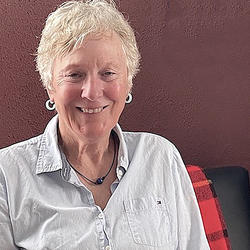Alexia Kosmider

Alexia Kosmider has traveled the academic terrain of anthropology, American studies, literary studies, queer studies and documentary filmmaking during her years at RISD. Her early scholarly work focused on the writings of turn-of-the-century Native writers. She published Tricky Tribal Discourse, which examines the poetry, short stories and verbal traditions of Alexandra Posey (Muscogee Nation), and has published essays on Ora Eddleman Reed (Cherokee identified), who was editor of an early territorial newspaper.
Alexia also produced and directed documentaries, including TransJourney, which was awarded the Audience Award at the Palm Springs LGBTQ Film Festival (2015). Her current work entails storytelling through script writing, where she collaborates with fellow writer Marianne Messina. Their stories highlight underrepresented characters, including women and LGBTQ+ identified characters.
Small Steps in Black Birkenstocks, Alexia’s first script, follows Kerri, a transgender naval scientist; Lorie, a nerdy widowed lesbian; Lori’s friend Cooper, a gay Black art professor; and Stephen, a self-proclaimed chick magnet, as they trip and tangle their way through dating, uprooting our sense of what love embodies and what love can bring. Small Steps was selected for Toronto’s Female Gaze Film Festival (2018) and awarded the James Seaver Award from the Rhode Island International Film Festival in 2019.
Alexia’s second script, Milkwood Manor, features nature lover Emily, who is driven to rescue monarch butterflies and feels threatened when her daughter insists that she move to Florida. Emily not only fights for the monarch’s habitat and her place at the manor but also for the attention of a handsome vet. Milkweed Manor was awarded the Romantic Comedy Award at Boston’s Lonely Seal International Film, Screenplay and Music Festival (2022) and was a finalist in the Houston Comedy Film Festival (2020) and the Rhode Island International Film Festival (2021).
Currently Alexia is focusing on a TV pilot that features the “tea girls,” who gather regularly for salon-style discussion: a retired lesbian dean, a Black gay art professor, an angry songwriter and a dog-crazed nurse. She also continues to pursue her scholarly interests in queer film and theory and serves on the editorial board of InterAlia, a peer-reviewed scholarly journal on queer theory and literature.